

Live From Mars was active July 1996-December 1997.

Each medium contributes what it does best. Participants in past projects report that students benefit most when all three components are utilized to the fullest.
On-line . . . . . . . . .
Print . . . . . . . . . .

The Internet breaks down the walls of the classroom and brings the world
and world-class researchers to any school, any place, any time.
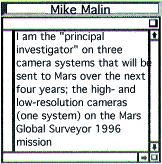
A Guided Tour of the project's on-line environment is accessible via:
http://quest.arc.nasa.gov/mars
Video . . . . . . . . . .
The print materials provide all a teacher needs to create classroom
lessons and Activities: the Guide (also accessible on-line) provides a
teacher-friendly, easy-to-use introduction to the entire project, and is
co-packaged with camera-ready masters of Student Worksheets and key
visuals to support the Activities, an original full-color poster, and
background NASA publications.
![]()
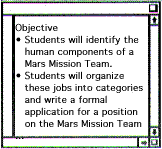
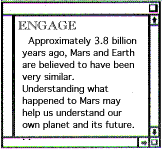

Television provides the sights and sounds, the people, places and
processes, which put a living context around the text.
Teachers rate the live component of the Live From... videos highly,
although most teachers use them on tape: there's no contradiction. The
excitement of the original live interactions is maintained while teachers
gain flexibility by using the videos on tape.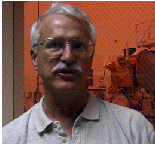
How the Components work together-an example
Activity 1.1, "Rocket Science 101" uses simple balloons to give students
hands-on experience with issues of thrust, fuel and payloads, as an
application of Newton's Laws. On November 19, 1996, Live From Mars,
Program 1, "Countdown", will feature a real-world application of these
principles with a report on the launch of Mars Global Surveyor. Students
in Worcester, MA, childhood home of American rocket pioneer Robert H.
Goddard, will interact live with today's rocket scientists at Cape
Canaveral, where Mars Pathfinder is being readied for launch. And on-line
students can find background information on the Delta II rockets that
will be used for both missions.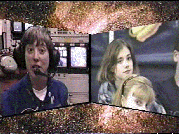
If you have questions, you'll find discuss-lfm responsive to your
individual interests and needs: this on-line Teachers' Lounge allows you
to make suggestions, ask for advice and share ideas, creating a "Virtual
Community" which turns the Guide, videos and other on-line materials into
living documents which will evolve during the course of the project.
There's no "royal road to Geometry" said Euclid, and there's no one way to
implement Live From Mars. We hope you'll work with us to find many right
ways to bring the exploration of the Red Planet to life for your
students. 

![]()